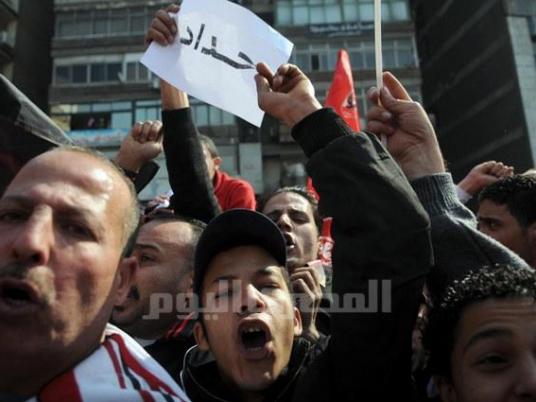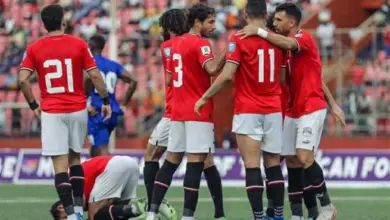
Riot police fired tear gas at protesters Thursday evening as thousands of people swarmed streets surrounding the Ministry of Interior to protest what they see as police complicity in the violence in Port Said yesterday that left 74 people dead.
Clashes are taking place on Mohamed Mahmoud Street, the scene of a fierce five-day-long battle last November. At the time, the military built a large concrete wall to block protesters. People are now in the process of dismantling the wall.
Electricity was cut off on Mansour Street, another street leading to the Interior Ministry, and fires are being set to light up the street, according to an Al-Masry Al-Youm report.
A field hospital has been set up and the majority of the injured are suffering from asphyxiation as a result of tear gas inhalation. The Health Ministry released a statement saying that there have not been serious injuries from the clashes, "only minor ones from teargas or thrown stones." The ministry said 388 people have been injured, and that 266 received treatment in the area while the rest were referred to nearby hospitals.
The scene is reminiscent of other clashes between protesters and security forces in November and December, with protesters forming human chains to ensure that ambulances carrying the injured to the field hospital can get through the crowds. Ambulance workers had been on strike, but an estimated 70 percent have returned to work to help those injured in the clashes. Motorcycles are being used to transport the injured.
Demonstrations are also taking place in Tahrir Square and in the Maspero area.
Protesters surrounded a Central Security Forces truck carrying new recruits on Talaat Harb Street in downtown Cairo. The driver of the truck fled, leaving the recruits behind in the crowd.
Protesters provoked riot police earlier in the evening, with some throwing rocks and a few brandishing tasers.
Protesters chanted slogans against the ruling military junta, which they hold responsible for Wednesday’s deadly events.
Three members of Parliament joined the protest earlier on: Amr Hamzawy, an independent liberal and Ziad al-Elaimy and Mohamed Abu Hamed of the liberal Egyptian Bloc coalition. Abu Hamed and Elaimy both said they will resign if no one is prosecuted for the incident within a week. It is unclear if the MPs left after the clashes started.
Upon arrival to Tahrir Square, some tried to convince the march not to head to the Interior Ministry in order to avoid bloodshed. Some ultras insisted on heading to the ministry and a few attempted to bring down the wall erected in November on Mohamed Mahmoud Street.
Some protesters removed the barbed wire blocking the way to the Interior Ministry and threw rocks at the security forces. Others formed a human shield separating the two sides to avoid violence and chanted, “Peaceful.”
The protesters held the ruling military council responsible for the violence and demanded the prosecution of its Field Marshal Hussein Tantawi. Some protesters also demanded Tantawi’s execution.
The Interior Ministry released a statement warning demonstrators against "creating chaos," saying that the ministry "appeals to the honorable people of Egypt to listen to the voice of reason and uphold the interests of the country in order to achieve the goals of the revolution," Al-Masry Al-Youm reported.
Among a noticeably weak security presence, fans of the Masry team attacked fans of the Ahly team after winning the game yesterday.
Echoing a widely held belief that the violence was orchestrated for political motives the protesters chanted, “This is not a sports incident, this is a military massacre.”
Mohamed Abdel Hamid, who was injured in yesterday's violence, accused the police of conspiring with those who attacked the Ahly fans to punish the ultras for criticizing Field Marshal Tantawi. "They left us to be slaughtered and didn't do anything," he said.
Abdel Hamid added that the protesters don't want to storm the Interior Ministry; they only want the rights of those who were killed.
"We all understand that what happened had nothing to do with a soccer match,” said Rasha Ibrahim, a 21-year-old protester. “We are protesting today to tell the Supreme Council of the Armed Forces that this is your end. You will leave. They killed too many people."




